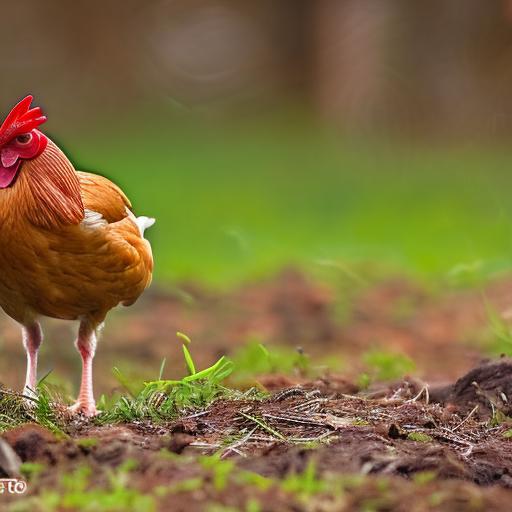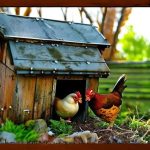Keeping chickens and goats together is a popular practice among small-scale farmers and homesteaders. It offers numerous benefits, including natural pest control, mutual companionship, efficient use of space, and sustainable farming practices. As someone who has personally kept chickens and goats together, I can attest to the advantages of this arrangement. In this article, we will explore the benefits, challenges, and considerations of keeping chickens and goats together.
Key Takeaways
- Keeping chickens and goats together is a popular trend in backyard farming.
- Benefits of keeping chickens and goats together include pest control, fertilizer production, and companionship.
- Understanding the behavior of chickens and goats is important to ensure they coexist peacefully.
- Housing requirements for chickens and goats should provide separate spaces for each species.
- Feeding chickens and goats together requires careful consideration of their dietary needs and preferences.
- Health concerns when keeping chickens and goats together include disease transmission and parasite infestations.
- Tips for keeping chickens and goats harmoniously include providing enough space, monitoring their interactions, and providing enrichment activities.
- Potential challenges when keeping chickens and goats together include territorial behavior and aggression.
- Legal considerations for keeping chickens and goats vary by location and may include zoning regulations and animal welfare laws.
- Before deciding to keep chickens and goats together, consider your space, time, and resources to ensure it is the right choice for you.
Benefits of keeping chickens and goats together
One of the main benefits of keeping chickens and goats together is natural pest control. Chickens are excellent foragers and will eat insects, grubs, and other pests that may harm your garden or crops. They also help to keep the goat’s living area clean by eating any dropped feed or vegetation. In return, goats provide companionship for the chickens. They are social animals and enjoy the company of other animals. The presence of goats can reduce stress in chickens and promote a sense of security.
Another advantage of keeping chickens and goats together is the efficient use of space. By co-housing these animals, you can maximize the use of your land. Goats can graze on pasture while chickens can roam freely, making use of areas that may not be suitable for grazing. This allows you to make the most of your available space and resources.
Furthermore, keeping chickens and goats together promotes sustainable farming practices. Chickens produce nutrient-rich manure that can be used as fertilizer for your garden or crops. Goats also produce manure that can be composted and used as a natural fertilizer. By combining these two animals, you create a closed-loop system where waste is recycled and used to benefit your farm or homestead.
Understanding the behavior of chickens and goats
It is important to understand the behavior of both chickens and goats before introducing them to each other. Chickens are social animals that establish a pecking order within their flock. They may display aggression towards new members until a hierarchy is established. Goats, on the other hand, are herd animals and rely on social interactions for their well-being. They may become stressed or anxious if they are isolated or do not have companionship.
When introducing new animals to the group, it is essential to do so gradually and in a controlled manner. Start by keeping the chickens and goats in separate enclosures but within sight of each other. This allows them to become familiar with each other’s presence without direct contact. After a few days, you can begin supervised introductions, allowing them to interact under close observation. This gradual introduction helps to minimize stress and aggression.
Signs of aggression or stress in either animal should be addressed promptly. Aggressive behavior in chickens may include pecking, chasing, or feather plucking. In goats, signs of stress can manifest as excessive vocalization, pacing, or refusal to eat. If any of these behaviors are observed, it may be necessary to separate the animals temporarily and reassess their compatibility.
Housing requirements for chickens and goats
Chickens and goats have different housing requirements that need to be considered when keeping them together. Chickens require a coop that provides protection from predators and the elements. The coop should have adequate ventilation, nesting boxes for laying eggs, and perches for roosting at night. It is also important to provide a secure outdoor run where chickens can exercise and forage.
Goats, on the other hand, require sturdy fencing to keep them contained. They are known for their ability to escape from poorly constructed enclosures, so it is crucial to invest in high-quality fencing. The fence should be at least four feet tall and made of materials that goats cannot easily climb or push through. Additionally, goats need access to shelter that protects them from extreme weather conditions such as rain, wind, and excessive heat.
Co-housing options for chickens and goats include providing separate areas within the same enclosure or allowing them to share the same space. If you choose to provide separate areas, make sure each animal has enough space to move around comfortably. If you decide to allow them to share the same space, ensure that there are no hazards or obstacles that could cause injury to either animal.
Feeding chickens and goats together
Feeding chickens and goats together requires careful consideration of their nutritional needs and appropriate food options. Chickens require a balanced diet that includes a combination of grains, protein, fruits, vegetables, and calcium. They also need access to grit, which helps them digest their food. Goats, on the other hand, are ruminants and primarily eat grass and hay. They also require minerals and salt to maintain their health.
When feeding chickens and goats together, it is important to provide safe and appropriate food options for both animals. Avoid feeding chickens foods that are toxic to goats, such as avocado, chocolate, onions, and certain types of plants. Similarly, avoid feeding goats foods that are harmful to chickens, such as moldy or spoiled feed.
To prevent overeating or food aggression, it is recommended to provide multiple feeding stations for both chickens and goats. This ensures that each animal has access to food without competition or aggression. Additionally, monitor their feeding behavior closely to ensure that they are consuming an appropriate amount of food and not exhibiting any signs of overeating or malnutrition.
Health concerns when keeping chickens and goats together

Keeping chickens and goats together comes with certain health concerns that need to be addressed. Both animals are susceptible to various diseases and parasites that can affect their overall health and well-being. It is important to implement preventative measures to minimize the risk of illness.
Common health issues for chickens include respiratory infections, mites or lice infestations, and egg-related problems. Regular cleaning and disinfection of the coop, as well as providing a clean and dry environment, can help prevent these issues. Vaccinations and regular health checks by a veterinarian are also recommended.
Goats are prone to parasites such as worms, coccidia, and external parasites like lice and ticks. Regular deworming and monitoring for signs of illness or infestation are essential. Providing clean bedding, proper ventilation, and access to fresh water can also help maintain their health.
It is important to recognize the signs of illness in either animal and take appropriate action. Common signs of illness in chickens include lethargy, loss of appetite, abnormal droppings, or respiratory distress. In goats, signs of illness may include decreased appetite, weight loss, diarrhea, or abnormal behavior. If any of these symptoms are observed, it is recommended to consult a veterinarian for diagnosis and treatment.
Tips for keeping chickens and goats harmoniously
To ensure a harmonious relationship between chickens and goats, there are several tips that can be followed. First and foremost, provide enough space and resources for all animals. This includes adequate housing, feeding stations, and areas for exercise and social interaction. Overcrowding can lead to stress, aggression, and the spread of disease.
Encouraging positive social interactions between chickens and goats is also important. Allow them to interact freely under supervision and observe their behavior closely. Provide enrichment activities such as perches or climbing structures that allow both animals to engage in natural behaviors.
Monitoring behavior is crucial when keeping chickens and goats together. Address any issues promptly to prevent escalation or injury. If aggression or stress is observed, separate the animals temporarily and reassess their compatibility. It may be necessary to provide additional resources or adjust the housing arrangement to promote harmony.
Potential challenges when keeping chickens and goats together
Keeping chickens and goats together comes with its fair share of challenges. One of the main challenges is the presence of predators and other external threats. Both chickens and goats are vulnerable to attacks from predators such as foxes, coyotes, and raccoons. It is important to implement appropriate measures to protect them, such as secure fencing, predator-proof housing, and regular monitoring of the surrounding area.
Maintaining cleanliness and hygiene can also be a challenge when keeping chickens and goats together. Both animals produce waste that needs to be managed properly to prevent the spread of disease. Regular cleaning of the coop and goat shelter, as well as proper disposal of manure, are essential. Additionally, providing clean bedding and fresh water is crucial for maintaining their health.
Balancing the needs of both animals can be another challenge. Chickens require a certain level of protection and security, while goats need space to roam and graze. Finding a balance between these needs can be challenging, especially if you have limited space or resources. It is important to prioritize the well-being of both animals and make adjustments as necessary.
Legal considerations for keeping chickens and goats
Before keeping chickens and goats together, it is important to consider the legal aspects of owning these animals. Local zoning laws and regulations may dictate whether or not you are allowed to keep livestock on your property. Some areas have restrictions on the number of animals you can keep or require specific permits or licenses.
It is important to research and understand the local regulations before bringing chickens and goats onto your property. Failure to comply with these regulations can result in fines or other legal consequences. Additionally, liability concerns should be taken into account. Make sure you have appropriate insurance coverage in case of any accidents or injuries involving your animals.
Is keeping chickens and goats together right for you?
In conclusion, keeping chickens and goats together offers numerous benefits but also comes with its challenges. The natural pest control, mutual companionship, efficient use of space, and sustainable farming practices make this arrangement appealing to many small-scale farmers and homesteaders. However, it is important to consider the behavior, housing requirements, feeding needs, health concerns, and potential challenges associated with keeping these animals together.
Before making the decision to keep chickens and goats together, it is recommended to do further research and seek advice from experienced farmers or homesteaders. Every situation is unique, and what works for one person may not work for another. By gathering information and seeking guidance, you can make an informed decision that is best suited to your specific circumstances.
If you’re considering keeping chickens and goats together, it’s important to understand the dynamics and requirements of both animals. While chickens and goats can coexist harmoniously, there are certain considerations to keep in mind. In a recent article by Poultry Wizard, they discuss the importance of providing a suitable floor for your chicken coop. The article highlights the different options available, such as using straw, wood shavings, or sand, and provides insights on the benefits and drawbacks of each choice. To learn more about creating an ideal living environment for your chickens, check out Poultry Wizard’s informative article on the floor of a chicken coop.
FAQs
What are the benefits of keeping chickens with goats?
Keeping chickens with goats can provide several benefits. Chickens can help control pests and insects in the goat’s grazing area, while goats can help keep the grass and weeds trimmed, creating a healthier environment for both animals. Additionally, chickens can provide a source of fresh eggs for the owner.
What are the potential risks of keeping chickens with goats?
There are some potential risks to keeping chickens with goats. Chickens can be vulnerable to predators such as foxes and raccoons, which may also pose a threat to goats. Additionally, chickens can carry diseases that may be harmful to goats, so it is important to keep the two species separated when necessary.
How can I ensure the safety of my chickens and goats?
To ensure the safety of both chickens and goats, it is important to provide separate housing areas for each species. This will help prevent the spread of disease and protect the animals from predators. Additionally, it is important to supervise the animals when they are together and provide adequate fencing to keep predators out.
What should I feed my chickens and goats?
Chickens and goats have different dietary needs, so it is important to provide separate feed for each species. Chickens require a diet high in protein, such as chicken feed or a mixture of grains and seeds. Goats require a diet high in fiber, such as hay or grass, as well as a mineral supplement.
Can chickens and goats share the same grazing area?
Chickens and goats can share the same grazing area, but it is important to monitor their interactions and separate them if necessary. Chickens may scratch up the ground and create dust baths, which can be harmful to goats if they ingest too much dust. Additionally, goats may accidentally injure chickens while grazing.
Meet Walter, the feathered-friend fanatic of Florida! Nestled in the sunshine state, Walter struts through life with his feathered companions, clucking his way to happiness. With a coop that’s fancier than a five-star hotel, he’s the Don Juan of the chicken world. When he’s not teaching his hens to do the cha-cha, you’ll find him in a heated debate with his prized rooster, Sir Clucks-a-Lot. Walter’s poultry passion is no yolk; he’s the sunny-side-up guy you never knew you needed in your flock of friends!







